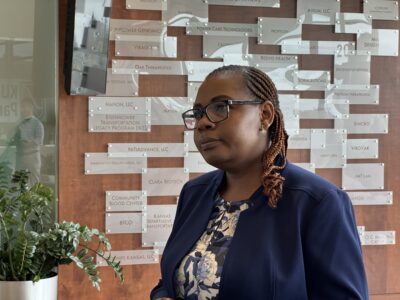Universities crack down on illegal downloads
Washington, D.C. ? You can’t miss them on campus.
Shiny white ear buds and iPods dangling as students bop in step on their way to class. Many of the students are listening to songs downloaded illegally. And though the idea of free songs may be music to their ears, all the recording industry hears is the swooshing sound of money flying out the window.
“College students remain a very significant part of the illegal downloading problem,” said Cary Sherman, president of the Recording Industry Association of America, at a U.S. House hearing last month.
Sherman claimed that more than half of students on college campuses download music illegally. The association maintains the industry has suffered billions of dollars in losses and has filed thousands of civil-action lawsuits in response to the downloading. In 2004, the association filed suit against two Kansas University students.
The government has started to take a vested interest in the problem. After all, every song not sold is sales tax not collected. Now the pressure is being put on universities to solve the problem of illegal file-sharing.
“Some schools have really stepped up to the plate. Some have not. Some have resisted,” testified Dan Glickman, former Kansas congressman and current president and chief executive officer of the Motion Picture Association of America.
3 strikes, you’re out
Kansas University’s policy for students who illegally download music is a three-strikes program. If the Motion Picture Association of America, the recording industry or other copyright owners send a complaint to the university:
¢ On the first offense, the student with the illegal files is ordered to delete them and fill out an online security quiz.
¢ On the second offense, the student must attend a 20-minute education session.
¢ On the third offense, the student is permanently banned from the computer networks in student housing.
Sherman went even further, saying “many of them resist taking action or do as little as possible in order to brush off further responsibility.”
Glickman, Sherman and other representatives of the entertainment industry asked universities to take action in three major areas: education, enforcement and the implementation of new technology.
KU has its own program for handling illegal-downloading violations.
“We are taking it seriously, but we are taking an educational approach, because that is what we are good at it,” said Alison Lopez, public relations and marketing manager for KU Information Services.
The KU education method is a three-strikes program.
If the Motion Picture Association of America, the recording industry or other copyright owners send a complaint to the university, the student with the illegal files is ordered to delete them and fill out an online security quiz.
A second offense brings a mandatory 20-minute educational session and – if that doesn’t work – the three-time offender is banned permanently from the computer networks in student housing.
In 2004, KU had 192 complaints and in 2005 had 196. So far this year, 146 complaints have been received.
The university does not take action against a student unless a complaint has been issued.
“KU does not actively go out and look for this. We don’t monitor the use. But when somebody brings something to our attention, we deal with it,” said Jane Tuttle, assistant to the vice provost for student success.
The entertainment industry would like to see a more active approach by universities.
Related articles
The University of Florida restricts the use of many peer-to-peer, or P2P, file-sharing programs often used for illegal file-sharing. Pennsylvania State University did the same, but created its own P2P network called Lionshare and customized it for academia.
But, William Fisher, a Harvard University professor of intellectual property law, testified before a House subcommittee last month that “suppressing illegal activity of this sort will never be fully effective unless good alternatives are available.”
The University of Maryland is one of a handful of universities trying to rise to that challenge.
Maryland provides a free music service called Ctrax. The service provides roughly 2.2 million songs that students can download to multiple computers.
But some students said they were unable to install the software and consistently received an error message. Other students hadn’t even heard of the program.
“We need to let students know that this service is an attractive legal alternative to the illegal activity,” said University of Maryland spokeswoman Amy Ginther.
KU hasn’t taken steps toward offering a similar legal alternative for downloading music and movies.
“That sort of approach doesn’t lead to meaningful behavioral change, which is what we are trying to do by engaging students individually,” Allison Lopez said.







